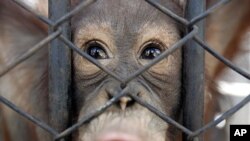Police in Thailand say an alleged wildlife smuggler who was arrested at the airport last month with several live, endangered animals hidden in his suitcase has since skipped bail and fled the country.
When Thai police arrested Noor Mahmood in May at Bangkok's Suvarnabhumi airport, they found a virtual zoo of endangered animals in his luggage.
Four leopard cubs, a bear cub, a monkey, and a red-cheeked gibbon were found sedated and packed into small cages.
The case was a high-profile success for officers battling Thailand’s thriving animal trafficking trade, but it proved to be short-lived.
Mahmood, who is a citizen of the United Arab Emirates, was released on a bail of $6,600 pending his court date. But police said that despite the charges, they learned he was given back his passport and allowed to leave Thailand.
Steven Galster, the director of the Freeland Foundation, an international organization fighting wildlife and human trafficking based in Bangkok, says it appears Mahmood’s political connections allowed him to escape, making a mockery of the undercover unit’s hard work.
"He got help from the UAE Embassy and from a Thai politician and maybe some other officers outside that unit who, over the course of the week pulled strings for him," said Galster. "They got his passport back. And, lo and behold, he quietly got back on a plane and skipped bail and left the country. So, we're not very happy about this."
A UAE Embassy spokesman acknowledged that officials helped Mahmood to get his passport back but said it is standard practice for any arrested citizen. Officials at the embassy and at the UAE Ministry of Foreign Affairs in Abu Dhabi have declined to comment on allegations that diplomats played a role in helping Mahmood flee Thailand.
Police Lieutenant Colonel Thammawat is with the National Resource and Environment division and the unit that arrested Mahmood. He said Mahmood appeared to be part of a well-funded, politically-connected smuggling ring that remains under investigation. He said diplomats are also under investigation, but he would not reveal the foreigners’ nationalities.
Thammawat says during the operation to arrest Mahmood they watched him closely as he went through airport procedures and he did not have the bags containing the animals until he was already past immigration. He says Mahmood must have had help getting them past airport security.
"Who? I don't know yet for now, who carried two luggage past X-ray," he said. "The guy get the luggage, you know, somewhere after X-ray, after immigration."
Thammawat says they are still waiting for airport authorities to provide security camera footage from the day he was arrested, which could reveal how the luggage got past security.
He says Mahmood was traveling first class with at least one accomplice who managed to escape onto the Emirates flight. He says the airline has refused to provide names of passengers.
Police say that upon his arrest Mahmood showed them photographs on his mobile phone of himself with former Prime Minister Thaksin Shinawatra in an apparent attempt to demonstrate his powerful connections.
Thaksin was ousted from power by the military in a 2006 coup and now lives in exile in Dubai to avoid jail for a corruption sentence.
Galster says Mahmood’s release shows that in Thailand people with money and influence still get away with breaking the law. He says although hundreds of wildlife smugglers have been arrested in the past decade, and the punishment is up to four years in jail, only one was given a prison sentence.
"The punishments are very weak," said Galster. "He could have turned around and sold one of those animals alone for 10,000 US dollars. He had 5 or 6 of those in his suitcases. Now, the maximum fine was about 1200 or 1300 US [dollars]. So, in knowing that nobody goes to jail it's worth taking the risk."
Galster says a law to increase punishments for wildlife trafficking was drafted 8 years ago but Thai lawmakers have yet to discuss bringing it into force.
With such light punishments, he says Thailand remains a hub for Asia’s wildlife trafficking.
By Thursday this week, animal trafficking police already had a new case to investigate.
Thai customs officials said hundreds of reptiles were found hidden inside unclaimed luggage from Bangladesh left at the Bangkok airport. The live animals included rare and endangered turtles and freshwater crocodiles worth about $33,000 that customs say were likely on their way to a Bangkok market.




